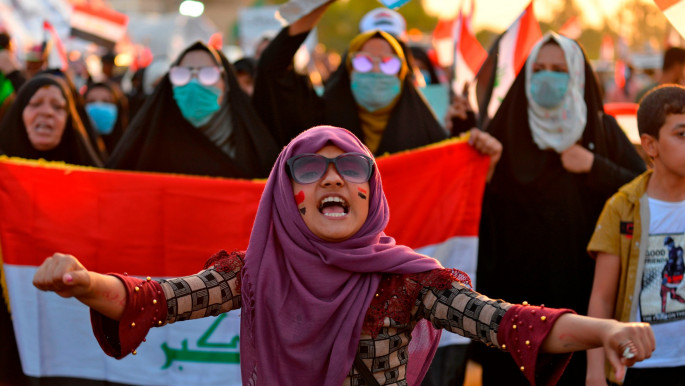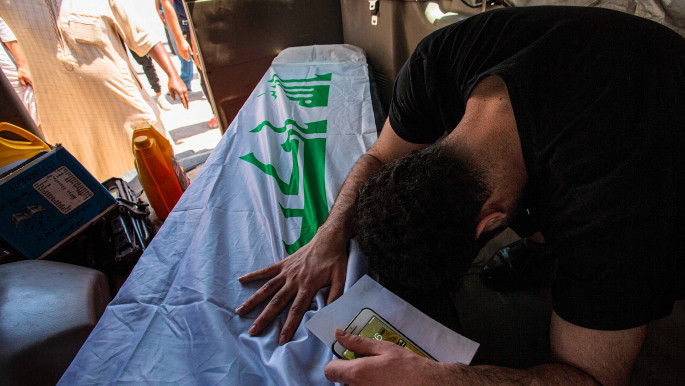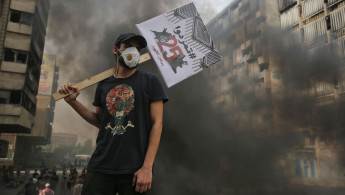'They are still trying to silence us': One year on, Iraq's youth rise again
Young people are by far the most affected by these issues, and have become the most desperate for change. One year on from the mass movement that shook the country, The New Arab speaks to those still rallying at the protests' epicentre in Baghdad's Tahrir Square.
"How come none of us has a job?" Al Hasen Mohsin exclaims in rage. As he vents his complaints, a group of dozens of friends cheer in encouragement.
The group stands in Tahrir Square, on a warm sunny Sunday afternoon. Iraqis are rising up once again, a year since the birth of a youth-led protest movement that saw over 600 demonstrators killed and some 30,000 people injured.
In a country where more than 60 percent of the population are under the age of 25, a third of them out of work, 25-year-old Al Hasen is voicing the central grievance of his generation.
 |
Young Iraqis claim nothing has changed: the political system is still being eaten up by corruption, nepotism and inaction |  |
Crowds that began gathering in Tahrir Square and on the adjacent Jumhuriya and Sinak bridges on Sunday morning soon exceeded thousands.
Many attempted to storm the concrete barriers set up by the government to prevent protesters from entering the Green Zone, the walled-off district on the other side of the Tigris River which houses Baghdad's most important government and diplomatic buildings.
Trying to scale the barricades, protesters chanted "thawra!" - meaning revolution in Arabic. Waving enormous Iraqi flags, protesters sung and shouted their demands for a homeland free from foreign interference and influence from countries such as Iran and United States, who "use Iraq as their playground," said Hamza, 22.
 |
|
| Read more: Iraq's reign of fear: Inside the violent power struggle killing Basra's activists |
Hamza is peremptory about his demand for a watan (homeland), cathartically repeating the word with a dreamy look in his eyes.
"If Iraq was a real country, I would have a job," he said. Instead, the country's stale public sector is filled with ageing employees on "astronomical" salaries, he adds.
Despite a temporary government coming into office last May led by Prime Minister Mustafa al-Kadhimi, who has scheduled elections for June 2021, young Iraqis claim nothing has changed. The political system is still being eaten up by corruption, nepotism and inaction, they say.
The street movement of last October had been almost stamped out by the Covid-19 pandemic and the accompanying restrictions during the following spring and summer.
However on the eve of the movement's first anniversary, the flame was rekindled. Just as the year before, Iraqis gathered briefly on 1 October, before taking a hiatus over the Muslim festival of Arbaeen, and resuming the demonstrations with even greater vigour on 25 October.
Just as last year, security forces have been stationed on the other side of the barricades, shooting tear gas canisters and water cannons. But the atmosphere is notably less violent than that of 2019, when security forces fired military-grade tear gas canisters directly at protesters, as well as being accused of enforcing a shoot-to-kill policy after using live ammunition against the crowds.
 |
More than 5,000 of the 30,000 injured last year have permanent disabilities as a result of the state-led violence |  |
More than 5,000 of the 30,000 injured last year have permanent disabilities as a result of the state-led violence, according to local media.
Today, the biggest danger to the protesters is probably the dozens of tuk-tuks that dart frantically between the bridges and the square. The small, brightly coloured taxis which have become emblematic of the movement are used to transport injured people from the clashes to the medical tents on the periphery. Here, teams of volunteers treat an array of ailments, from knife wounds, to broken eye-sockets, to sprained ankles. The most severe cases are taken to hospital by ambulance.
 |
| Read more: A national identity born of protest and anger brews in Iraq and Lebanon |
This Sunday, Ali Saleh has seen around fifty injured demonstrators admitted to the medical tent he manages in Tahrir Square, far less than that of the previous year. However almost a half of them have been taken to hospital.
"They were bleeding severely," Saleh told The New Arab. "Honestly, I don't see any change from last year. I see the same kind of wounds," he said.
No deaths were mourned on Sunday, but that gave Ali Saleh little reassurance. "They [security forces] are still beating us up, still trying to kill us and silence us."
 |
I don't see any change from last year. I see the same kind of wounds |  |
How can one be optimistic, in a country where the poverty rate is expected to double in 2020 alone? According to government figures, the poverty rate has already jumped from 22 to 34 percent during the pandemic, and is predicted to reach 40 percent by the end of the year.
It may be the second-largest producer within OPEC (Organization of the Petroleum Exporting Countries), but Iraq does not seem to have anything to offer to its future generations.
 |
|
| The Iraq Report: Anti-corruption activists assassinated with impunity |
With no income, young people are forced to stay dependent on their families and are slowly losing hope in a conservative society that often feels suffocating. According to UN-OHCHR, suicide rates among the young generation are on the up: 298 cases were recorded between 1 January and 30 August this year, the highest toll since 2003.
"I admit it's something I considered a few years ago," Ali Riyadh told The New Arab. The 27-year-old poet and journalist living in Baghdad's Sunni district of Abu Ghraib. Thanks to support from friends and the hours spent discussing politics and poetry in the cafés of Baghdad's Karrada neighbourhood, Riyadh has managed to work through his issues for the time being.
Ali has been a frequent attendee at Tahrir's rallies since 2 October last year.
"I saw my friends getting shot on the 1 October, and I knew I had to support them. I never missed a day last year, and if the movement continues, I will do the same from now on," he said.
Sofia Nitti is an Italian video journalist based in Erbil, Iraq
Follow her on Twitter: @SofiaNitti



